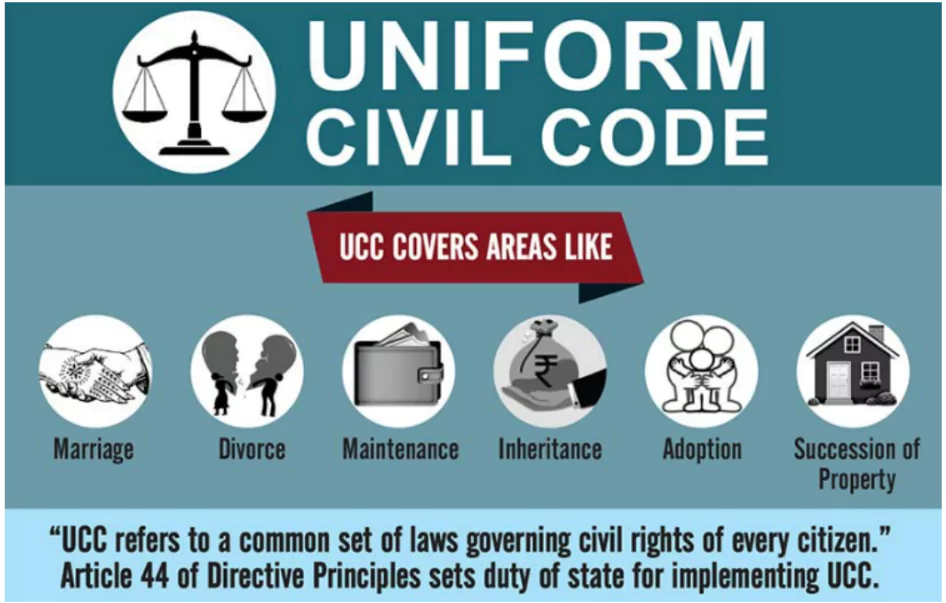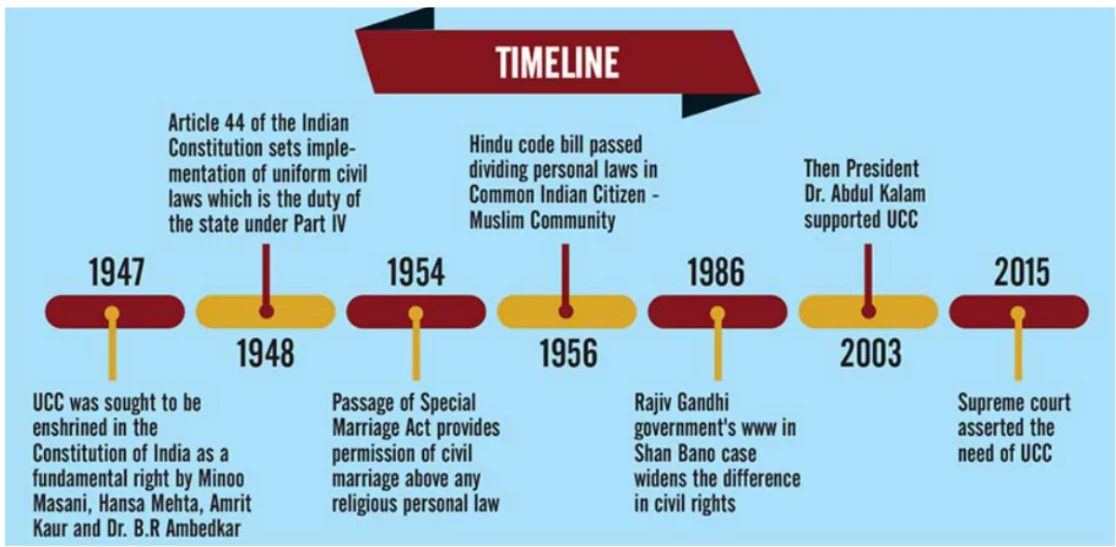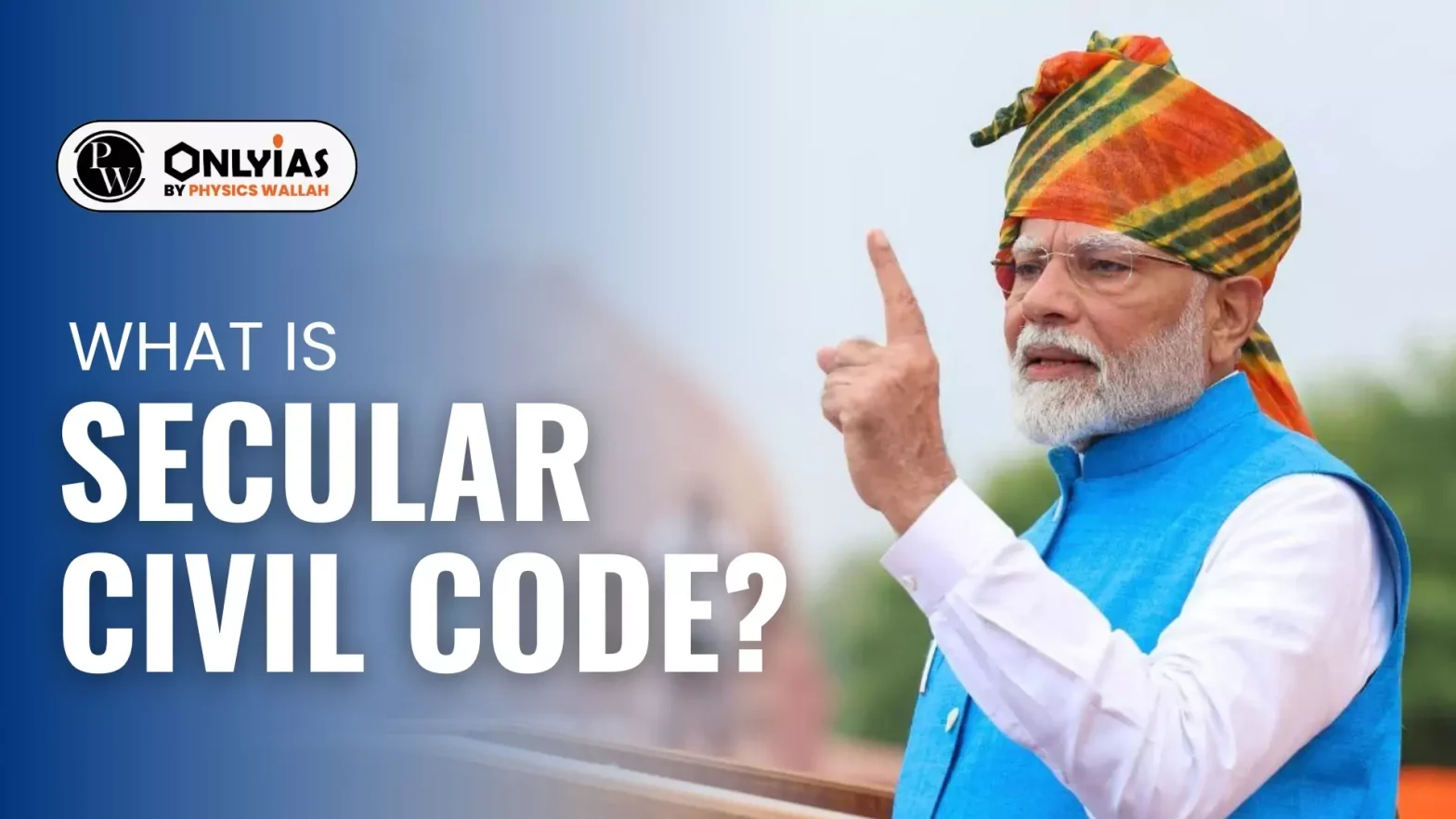The Prime Minister in his Independence day speech made a bold call for the implementation of a Secular Civil Code (SCC), reigniting a debate that has been lingering for decades.
About Secular Civil Code (SCC)

- Definition: A Secular Civil Code, also known as Uniform Civil Code (UCC), proposes a single set of laws governing personal matters—such as marriage, divorce, inheritance, and property rights—for all citizens, regardless of their religious affiliations.
- Diverse Personal Laws: India currently operates under multiple personal laws based on religion, including Hindu law, Muslim law (Sharia), and Christian law.
- Objectives of SCC
- Unified Legal Framework: The SCC aims to replace these varied legal systems with a common code that applies uniformly to all citizens.
- Equality and Uniformity: The goal is to achieve legal uniformity both across different communities and within them, ensuring equal rights and protections for men and women.
- Constitutional Provisions: The Directive Principle of State Policies mentioned in Article 44 of the Indian Constitution provides that “The State shall endeavor to secure for the citizens a uniform civil code throughout the territory of India”.
- However, being a directive principle, it is not justiciable.
- UCC aligns with liberal ideology and falls under Liberal-Intellectual Principles.
- Fundamental Rights: Articles 14 (equality before the law), 15 (prohibition of discrimination), and 21 (right to personal liberty) support the principles underlying the SCC.
Enroll now for UPSC Online Course
Historical Context
- British Colonial Period Under British rule, uniform criminal laws were established in India, but family laws remained diverse due to their sensitive nature.
- Constituent Assembly Debates: During the drafting of the Indian Constitution, discussions on the UCC were influenced by various perspectives:
- Muslim Members raised concerns about the potential impact of a UCC on religious personal laws, advocating for safeguards to protect community-specific practices.
 Supporters of UCC like K.M. Munshi, Alladi Krishnaswami, and B.R. Ambedkar argued in favor of the UCC to ensure equality and uniformity in civil matters.
Supporters of UCC like K.M. Munshi, Alladi Krishnaswami, and B.R. Ambedkar argued in favor of the UCC to ensure equality and uniformity in civil matters.
- Views of Dr. B.R. Ambedkar: Ambedkar championed the UCC as a means to ensure secularism by treating all citizens equally under the law.
- He highlighted that other laws, such as criminal procedure codes and property laws, already applied uniformly across India, supporting similar consistency in personal laws.
Current Status of Secular Civil Code in India
- No National SCC: India does not currently have a Secular Civil Code implemented nationwide. Instead, personal laws vary by religion, governing issues like marriage, divorce, inheritance, and adoption for different communities.
- Efforts Towards UCC: The Prime Minister has advocated for a secular civil code, echoing Dr. Ambedkar’s vision of a unified legal framework. This call aims to address perceived communal and discriminatory aspects of existing laws and to unify the legal system.
- Supreme Court’s Stance: The SC has emphasized the need for a UCC to eliminate laws that divide the country along religious lines.
- Steps Taken by the Central Government
- Special Marriage Act, 1954: Provides a secular framework for marriage, applicable to all Indians regardless of religion, including those abroad.
- Hindu Code Bills (1950s): Introduced to codify and unify personal laws for Hindus, including Sikhs, Jains, and Buddhists.
- The key acts are Hindu Marriage Act, 1955, Hindu Succession Act, 1956, Hindu Minority and Guardianship Act, 1956, Hindu Adoption and Maintenance Act, 1956
- Steps Taken by States
- Goa: Goa has a UCC under the Goa Civil Code (Portuguese Civil Code of 1867), which applies uniformly to all Goans, regardless of religion or ethnicity.
- Uttarakhand: Uttarakhand recently enacted the Uttarakhand Uniform Civil Code Bill 2024, implementing a UCC for matters such as marriage, divorce, and inheritance, applicable to all residents except Scheduled Tribes.
Check Out UPSC CSE Books From PW Store
|
Supreme Court Judgements in relation to Secular Civil Code
|
| Mohd. Ahmed Khan vs. Shah Bano Begum (1985) |
- The SC ruled that Muslim women are entitled to maintenance beyond the iddat period under Section 125 of the Criminal Procedure Code.
- The court observed that implementing a UCC could help resolve legal contradictions arising from religious laws.
|
| Sarla Mudgal vs. Union of India (1995) |
- The SC held that a Hindu husband who converts to Islam cannot legally remarry without first dissolving his original marriage.
- The case highlighted the need for a UCC to promote gender justice and equality in marital laws.
|
| John Vallamattom vs Union of India (2003) |
- The SC expressed that it was a matter of regret that Article 44 of the Constitution has not been given effect.
|
| Shayara Bano vs. Union of India (2017) |
- The SC declared the practice of triple talaq unconstitutional, as it violated Muslim women’s fundamental rights.
- It also suggested that Parliament should pass legislation to regulate Muslim marriages and divorces..
|
| Joseph Shine vs. Union of India (2018) |
- The SC struck down Section 497 of the IPC, which criminalized adultery, ruling it unconstitutional for violating Articles 14, 15, and 21 of the Constitution.
- The court called for gender-neutral laws and suggested a UCC to address discrepancies in personal laws.
|
| Indian Young Lawyers Association vs. State of Kerala (2018) |
- The SC addressed the ban on women of menstrual age entering the Sabarimala temple, emphasizing the need for a UCC to reconcile conflicting rights and ensure gender equality across religious practices.
|
Argument in Favour of Secular Civil Code
- Strengthening Secularism: UCC would uphold secularism by removing outdated personal laws that perpetuate inequality. It ensures equal legal treatment for all citizens, irrespective of religion, promoting a unified legal framework that fosters national unity.
- Equality and Social Justice: UCC would eliminate discriminatory practices embedded in personal laws, particularly those affecting women. By standardizing civil laws, it would guarantee equal rights and protections for all, advancing social justice.
- Even within a religion, there is not a single common personal law governing all its members. E.g. for registration of marriage among Muslims, laws differ from place to place.
- Preservation of Religious Freedom: UCC is focused on civil matters like marriage, divorce, and inheritance, leaving religious practices untouched. This approach aligns with practices in other democracies where a common legal framework coexists with religious freedom.
- Modernization of the Legal System: The UCC would streamline and modernize India’s legal framework, replacing the complex and inconsistent personal laws with a simplified system. This would reduce legal uncertainty and prevent the exploitation of legal loopholes.
- For instance, the case of Sarla Mudgal v Union of India highlighted how individuals could exploit the differences in personal laws to circumvent legal restrictions.
- Judicial Efficiency: Implementing UCC would significantly reduce the burden on the judiciary by resolving numerous personal law disputes efficiently. This would free up resources to address other critical national issues, improving overall judicial effectiveness.
- With nearly 4.70 crore cases pending across courts in India as of March 2022, the judiciary is struggling to keep up with the backlog
- Global Perception: Adopting a UCC could bolster India’s global reputation by showcasing its dedication to equality, secularism, and human rights.
- Fulfillment of Constitutional Duty: Article 44 of the Indian Constitution mandates that the state shall endeavour to secure a Uniform Civil Code for all citizens.
- Promotes national integration: Uniform Civil Code will separate religion from social relations and personal laws, ensuring equality and thus promoting harmony and national integration.
Arguments Against Secular Civil Code
- Legal Pluralism in Civil Laws: Indian laws already maintain a uniform code in many civil matters, such as the Indian Contract Act and Civil Procedure Code. However, states have made numerous amendments, leading to diversity even within secular civil laws.
- Constitutional Contradictions: Articles 371(A) to (I) and the Sixth Schedule of the Constitution provide special protections to certain states, reflecting a recognition of regional diversity in family laws.
- The inclusion of personal laws in the Concurrent List supports the protection of this diversity, highlighting a contradiction with the push for uniformity under Article 44.
- Cultural and Religious Plurality: The UCC may threaten India’s pluralistic society, where people have deep faith in their religious doctrines.
- The 2018 Law Commission of India stated that UCC is “neither necessary nor desirable” at this stage, emphasizing that secularism should ensure peaceful coexistence of cultural differences, not undermine them.
- Essence of Indian Secularism: The Supreme Court in T.M.A Pai Foundation v. State of Karnataka highlighted that Indian secularism is about recognizing and preserving diverse identities within a united nation.
- The UCC might conflict with this principle by potentially eroding the coexistence of multiple individual identities under a national identity.
- Challenges in Drafting a UCC: The absence of a clear guideline or vision for drafting the UCC is a significant obstacle. The complexity of blending all personal laws or creating a new law that adheres to the constitutional mandate complicates consensus-building.
- Concerns of Minority Communities: Minorities often perceive the UCC as an imposition of a majoritarian outlook, leading to an infringement on their constitutional rights under Articles 25 and 26.
- Potential Hindu Bias: The Uniform Civil Code may potentially enforce a code that is influenced by Hindu practices in all communities
- Diverse Rituals and Customs: Tribal communities and other minority groups have distinct marriage and death rituals that differ significantly from Hindu customs. There is concern that the UCC could impose uniform practices, leading to the prohibition of these unique customs.
- Implementation Challenges: Implementing the UCC in a country as diverse as India, where religious communities follow their own personal laws, poses significant challenges.
- The Law Commission of India suggested that instead of enforcing a UCC, it is more prudent to study and amend discriminatory practices within existing personal laws.
Enroll now for UPSC Online Classes
Way Forward
- Embracing Diversity over Uniformity: The UCC should recognize India’s multiculturalism, emphasizing that unity is more important than uniformity, as supported by the Indian Constitution.
- Inclusive Consultation with Stakeholders: Broad consultations with religious leaders, legal experts, and community representatives are essential for ensuring the UCC is seen as fair and legitimate.
- Achieving Cultural Sensitivity and Equality: Lawmakers must balance removing unconstitutional practices with respecting cultural traditions, aiming for equality and gender justice.
- Constitutional Protection of Cultural Autonomy: The Constitution supports cultural autonomy, with Article 29(1) safeguarding diverse cultures. Communities should align practices with values to ensure justice.
- Promoting Education and Public Awareness: Effective implementation of the UCC requires educating citizens through extensive outreach efforts to ensure understanding and acceptance.
Conclusion
- Moving beyond outdated and divisive personal laws is essential to achieving the constitutional vision of an India where all citizens are treated equally. under the law.
- As Babasaheb Ambedkar said, ,“Law and order are the medicine of the body politic, and when the body politic gets sick, medicine must be administered.” The SCC is the medicine India needs to address cure the inequality and injustice that have plagued our society for too long.
![]() 23 Aug 2024
23 Aug 2024


 Supporters of UCC like K.M. Munshi, Alladi Krishnaswami, and B.R. Ambedkar argued in favor of the UCC to ensure equality and uniformity in civil matters.
Supporters of UCC like K.M. Munshi, Alladi Krishnaswami, and B.R. Ambedkar argued in favor of the UCC to ensure equality and uniformity in civil matters.